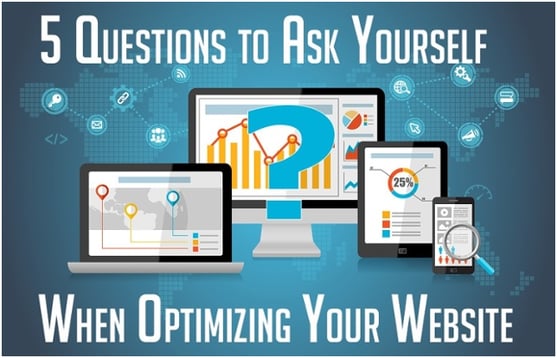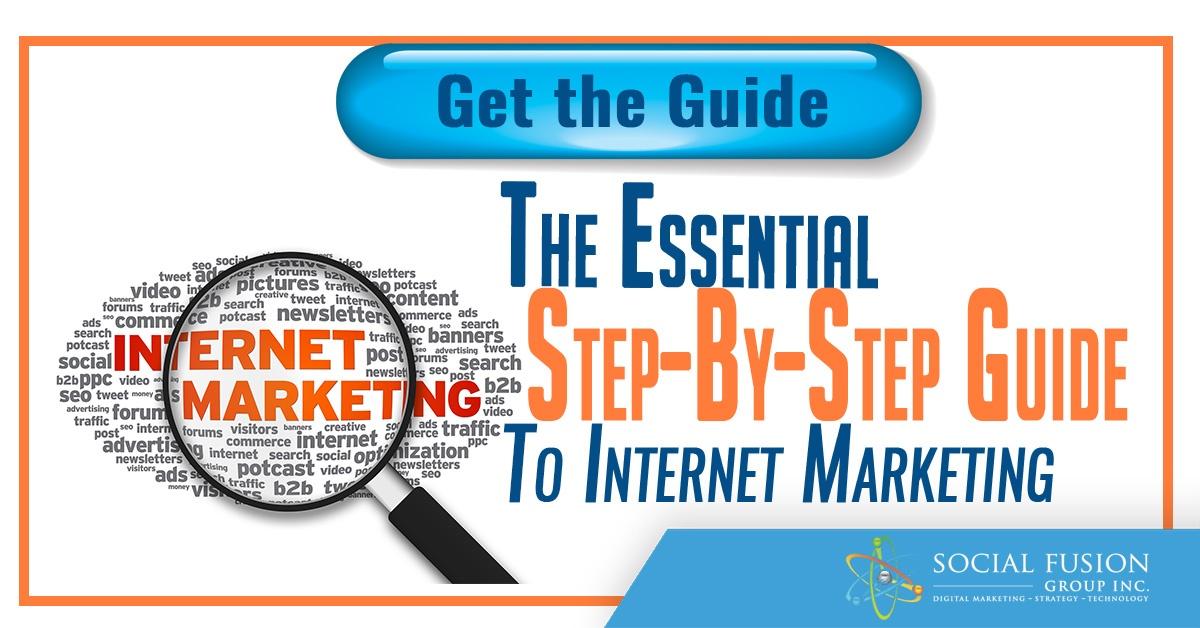Oftentimes we are so preoccupied with creating the ideal blog post, nailing down the perfect strategy for social media, creating the perfect offer, and generating leads, that we neglect (or even completely forget) one very important element of online business… our website.

Being essentially one of the first things potential customers come across after a relevant Google search, it is imperative that our website is not only optimized for search engines, but also for an ideal viewer experience as well.
Here are five questions that you need to ask yourself to self-assess your website optimization.
1. What's The Purpose Of My Website?
In all honesty, some of us might actually stop at the first bullet and say, "You know what? My website is a placeholder." While for some this might be just fine, for others it could in fact mean a wasted opportunity.
Websites are great at supporting your brand image and acting as a central business hub for visitors, and customers. A placeholder generally will not help you gain significant online revenue, and if not updated might even hinder your image.
So in order to avoid the above mentioned, you will need to focus on a strategy that utilizes your site as a means of:
- Generating revenue
- Creating lead generation opportunities
- Creating authority for you online
Ideally, you will want to figure out the purpose of your website before it is established, but for those of you who have already created a “placeholder site” it is never to late to make the appropriate changes and optimize it to its fullest potential.
2. Does My Page Flow Make Sense For Users & Search Engines?
Once you figure out the main purpose of your website, it is time to start thinking about its design, the user experience, and the flow. One very important thing to keep in mind here is that you are not building this site for you, you're building it for your visitors.
When mapping out the logical progression your visitors will be making throughout your site, it would be wise to use their perspective, not your own. Here your target audience provides you with all the insight, what they want to see, what they are interested in exploring, what they are interested in buying, and so forth.
For instance, the flow of your website might look something like this: the homepage flows to the product page, the product page flows to a case study, and the case study flows to the contact us. Whichever the case, be sure to map the flow out on a piece of paper first, to can see if it makes sense.
3. What Do I Want The User Experience To Be Like?
If you have properly defined your target audience, you should have a lot of that lined our already. While your current audience is important, you also need to make sure that your website is easy to navigate for first-time visitors.
By the time you get ready to launch your new website (or the redesign of your existing page), you will want to have someone who has never visited your site test it out first. You might know all the ins and outs of your website like the back of your hand, but first time visitors don’t have that luxury.
If the are they able to follow the flow that you want your users to follow, then congratulations, the way you mapped your site is successful. On the other hand, if they were having trouble navigating or finding what they were looking for, then it might time to go back and re-map your pages.
User experience also touches on the design of your site. Keep in mind however, that trends in website design are constantly evolving. What is cutting edge and visually appealing this year, may be antiquated by next year. That being said, there is a level of design that you need to surpass in order for your website to appear professional.
Remember, this is the first impression that your potential customers will have of your business. Use this to your advantage and go out of your way to make sure that your on-page user experience will be a 10 out of 10.
4. What Challenges Do I Need To Prepare For?
Just like in all things digital marketing, website creation and optimization will likely not be a “smooth sailing” experience. Challenges will arise, so it’s best to be prepared for them so you can tackle them early on. Here are a few common issues that might appear when launching a new site.
- Technology: Most of us don’t have the technical expertise to solve a potential coding issue, a crash, a 404, or any other behind the scenes issues. While educating yourself in HTML and web design is always a good idea, hiring someone to maintain your site and help you out in such instances is also a viable option.
- Performance: What if you missed something while mapping and you see that your site is not performing as you would like it to down the line? Again if you lack the technical expertise to solve the issue yourself, perhaps getting professional help is the best option.
- Tracking: If you can't see your data or you're not capturing your data correctly, how do you get that solved?
- Data: Oftentimes, the challenge you might face might not be technical at all. Conversely, everything might be working fine, but you might not yet know what and how you should be tracking your date.
If you fall into categories 3 and 4, worry not, we’ve got you covered in the next section.
5. How Do I Track My Website Effectiveness?
The first thing you need to do is to understand what it is you want to measure. Are you measuring visits, time on site, or maybe even the sources of the traffic? Where are people coming from? Did they come to your site organically? Did they come from referrals? Each one of those sources comes with a different strength, organic being the strongest source of traffic.
Then you want to measure leads. How do you do that? The simplest thing to do is to quantify the leads that you have, then look at landing pages, the traffic to the pages, conversion rates of the pages, etc.
Then look at the engagement related KPIs. You want to understand if people are engaging. Are they sharing? Do they like your posts? Are they commenting? Are they mentioning? Are they retweeting? You need to figure out how to optimize and then how to measure what you're looking to optimize.
So how can you measure all the above? With tools that automate the tracking process. For traffic, you'll want to definitely have Google Analytics tracking on your site. You may want some distinct tracking links for specific pages so if people come through that specific link, you know the source they came from. This essentially gives you a higher level of insight to your traffic.
For leads, you're looking at landing pages and at email systems. There are a lot of tools out there that work for both, one being Hubspot. Next, you have the engagement. How do you check to see if you're going to measure that? You have social analytical tools and there are quite a few of those tools out there too, like Hootsuite or SEMrush.
Once you’ve answered these questions for yourself, you should have a clear idea of where you need to make improvements on your site. Remember, your work as an online marketer is never finished.
Take this list of questions out throughout the year and assess how your website is doing at any point in time. And as always, feel free to ask us any questions, or leave a comment below!
For more digital marketing insight, be sure to check out the articles below:
- 5 Marketing Magnets That Drive Lead Generation
- 4 Tactics for a Better LinkedIn Content Strategy
- Twitter Optimization: Creating A Winning Twitter Page
- 10 Types Of Blogs To Make Content Marketing More Effective



